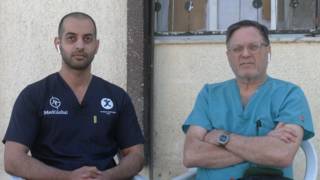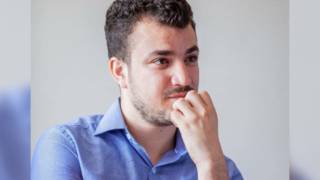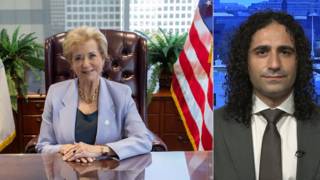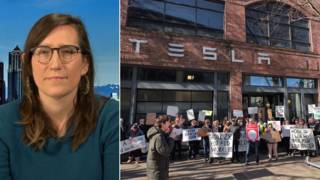
Guests
- Fadi Deebshot putter in the 2024 Paralympics representing Palestine.
- Shireen Ahmedsenior contributor to CBC Sports and a lecturer in the journalism program at Toronto Metropolitan University.
- Dave Zirinsports editor for The Nation magazine and host of the Edge of Sports podcast.
In Part 2 of our roundtable on the 2024 Summer Olympic Games, Paralympian athlete Fadi Deeb discusses being the only Palestinian member of the Olympic delegation from Gaza and how an Israeli airstrike just killed his best friend in a school bombing. We also speak with CBC Sports contributor Shireen Ahmed about how Algerian boxer Imane Khelif won the Olympic gold medal in a major victory for the athlete, who competed while facing a torrent of abuse, including from high-profile transphobic observers such as Donald Trump and author J.K. Rowling, who falsely claimed Khelif was a trans athlete and should be banned from competing. At the first-ever Olympic breakdancing competition of the games, a member of the Olympic Refugee Team from Afghanistan known as “b-girl Talash” was disqualified when she wore a cape that said “Free Afghan Women.” “It’s the suppression of athlete activism and voices that is so troubling, particularly with women, who are too often excluded and silenced in sport,” notes Ahmed. We are also joined by Dave Zirin, sports writer for The Nation, who discusses the “social cleansing” of unhoused people ahead of the games in Paris, and activism leading up to the 2028 Olympics in Los Angeles.
More from this Interview
- Part 1: 2024 Paris Olympics Highlights and Lowlights: From Hijab Bans to Social Cleansing to Boxing Gold
- Part 2: Meet Fadi Deeb, Palestinian Paralympian from Gaza Who Lost 15 Relatives in Israeli Assault
- Part 3: Olympics: Gazan Paralympian Is Shot Putter; Algerian Imane Khelif Wins Boxing Gold; Activism Silenced
Transcript
AMY GOODMAN: This is Democracy Now!, democracynow.org, The War and Peace Report. I’m Amy Goodman.
We continue now with Part 2 of our look at the 2024 Summer Olympics in Paris, which held its closing ceremony on Sunday. We’re joined by Dave Zirin, sports writer for The Nation magazine. He just returned from Paris covering the Olympics. Shireen Ahmed is with us, senior contributor to CBC Sports, who has been covering the Olympics. And in Paris, Fadi Deeb is with us, representing Palestine as a shot putter in the 2024 Paralympics in Paris, the only member of the Palestinian Olympic delegation from Gaza. He’s the only Paralympian athlete from Palestine to compete in the 2024 Summer Games, which begin at the end of August, the Paralympics. He’s been disabled since he was shot by an Israeli soldier in Gaza City in 2001, and has lost members of his family in Gaza, killed by the Israeli military since October.
Fadi, I want to continue with you. In Part 1 of our conversation, you talked about being a shot putter from Gaza. And I wanted to step back for a moment, and if you can tell us what the Paralympics are and the significance for you of performing in them, having been shot more than 20 years ago in Gaza by an Israeli sniper?
FADI DEEB: Yes. Number one, started from the first as a normal volleyball player when I have — like, the youngest player in the volleyball of the national team of Palestine. So, on the 4th of the October, 2001, when I get my disability, because I get shot from the Israeli sniper in Netzarim in the east of Gaza. So, I want to show how much the sport is very important for us as a Palestinian people, and especially the people in Gaza Strip, so it’s like something giving us to get out our negative feelings and our negative pressure soul. Like a child in 18 years old and he get his disability, like, this is very hard, but in the same time, we cannot give up. We must continue our life to think about something like positive and active. So I continue, like the many people that get their disability in sports.
So, I start with the Palestinian Paralympic Committee to play, like, a sport like a ping pong, like basketball, like athletics games like shot put, like disc and javelin. And I get six international medals in these games. These games is like a start for the Palestinian people with the people with disability, because we have like a huge number, as I told, like more than 120,000 people with disability before, and now we get like more than 10,000 people with — new people with disability in this last genocide. So we are talking about very huge number of people with disability. So, by sport, and under the social inclusion programs, we start with the people with disability to improve them, like in the — to damage them in the clubs, in the federation, by sport, sport by — for sport and, after, for competing.
So, this is Fadi. It’s like start with the ping pong, and he’s a champion of Gaza Strip like three years, but it’s not enough for me. And I’m start — from 2004 up to now, the only player and the first one he’s playing in the Europe 10 years as a professional basketball player. And it’s not enough for me, because we have many things, like gold, like, hopes inside of us. So, this is why I’m, like, joined the Athens Games, and I got the six international medals. And I’m just continue.
When you want to talk about, like, sport in Gaza Strip, you talk about very hard situation and very bad weathers. You cannot make a balance between the situation in Gaza Strip and outside. There is no equipment, no materials, no courts, court, no stadium. We’re just using, like, sometimes like normal land or streets, as example. Sometimes I’m training like in the street, that we have — we don’t have, like, too much shot put or enough equipment, so we just start to use something like look like the shot put, like rock or stone or something like this. About disc, we don’t have like the original disc as we use it in the competition. So sometimes we’re using like metals look like similar for the disc. Maybe it’s more heavier, but we must use it, because everything is like under the security of Israel.
And so, it’s like we have — in Gaza Strip, we are living in like a box. We cannot go outside. Sometimes we are training all of the year, and when it’s the time of the competition, I’m so sorry, we don’t have, like, a permit to go outside, so you must stay in Gaza. So, it’s like too much like a challenge to — about to be life in Gaza, about your sport, about your dreams, about your hopes. Everything is like a challenge in Gaza. And all of this, it’s like one part, and in the second part, there is not any safe place in Gaza. So, in each second, at each moment, you are like a target for the killing machine.
AMY GOODMAN: Some 400 athletes, coaches and others are estimated to have died in Israeli attacks since October. The victims include the Olympic football team coach Hani Al-Masdar, the volleyball star Ibrahim Qusaya. Among the Palestinians who competed in Paris this summer in the Olympics were track athlete Layla Almasri and swimmer Yazan Al-Bawwab. So, as part of the Olympic Paralympic team, you’re there with them, is that right, Fadi?
FADI DEEB: Yes, sure. Yes, it’s right. It’s right. But I’m also — I’m there. I’m alone. I’m the only athlete in the Paralympic Games, because there is no permit or flexibility for the players from Gaza to go outside. So, I’m now — now I’m the voice for them to speak. I’m like a voice and a message for them to speak in the Paralympics, to show the world what is happening in Gaza Strip.
So, we are talking about more than — more than like 300 athletes killed in Gaza Strip now, and especially about people with disability. Before yesterday, I lost my best friend. He’s the Arab swimmer champion. His name is Majdi El-Tattar. He is killed in the last school bombed and attacked. And he’s the champion. He’s amputating his legs, and he’s the swimmer Arab champion. And he’s killed. And there is many people with disability athletes killed, too. And when we talk about, like, more than, like, 120 persons, like, still arrested as a disability in Israel, and there is no reason about — this is why I’m alone here in this, want to compete in this Paralympic, because there is not any chance for the player from Gaza to join me to be in Paris 2024.
AMY GOODMAN: I want to talk about one of the other big stories at the Olympics. Shireen Ahmed, I wanted to ask you about the Algerian boxer Imane Khelif, who won Olympic gold Friday in a major victory for the athlete, who competed while facing a torrent of abuse, fed in part by harassment from high-profile transphobic observers, including Donald Trump, J.K. Rowling, who falsely claimed she was a trans athlete and she should be banned from competing. Can you tell us her story?
SHIREEN AHMED: Absolutely. So, Imane Khelif is an Algerian boxer. Khelif is not new to the boxing scene and had been competing for a while. She actually competed in Tokyo, where she didn’t rank as highly. Now, part of her story, which is really important, is that she actually started training with a famous Cuban boxing coach, so her technique and her ability to maneuver within the ring, it developed really, really well, and she’d been working on that for a while. So, there’s part of her athletic development.
But the reality was, is that after she beat an opponent in a previous bout, the IBA, the International Boxing Association, which is the — used to be the governing body for this — right now they were suspended by the IOC. And you know they have to be really bad, Amy, if the IOC is going to suspend somebody. So, basically — or an organization, rather. So, essentially, they flagged her with some unnamed test that she allegedly failed. And Lin Yu Ting, who also won gold, was subject to the same abuse.
AMY GOODMAN: From China.
SHIREEN AHMED: So you’ve got two racialized women who actually — from Taiwan — who actually — Lin Yu Ting is from Taiwan. You’ve got two racialized women boxers who are being subject to this kind of abuse and harassment because they beat traditional, you know, European models of beauty, what have you, which is what happened specifically with Khelif. When she beat Italian boxer Angela Carini, there was this massive uproar that Carini had to face a man. No, just because a woman doesn’t look like what you think doesn’t mean she’s not a woman. That’s the first issue.
And secondly, to sort of spread this kind of information is not only a gross misuse of journalistic power, it’s against all ethos. We saw journalists, Amy, get involved in spreading this information and take Angela Carini’s side. Like, you actually had journalists from The Guardian, which is otherwise a notable, you know, entity, a journalistic entity, taking sides in this, which is really worrisome.
And so, Khelif had to sort of compartmentalize, focus on her game. Her father went on media and showed her birth certificates, which I found to be heartbreaking. No parent should have to endure this to literally read from her papers. And although my Arabic is very limited, he kept saying ”binti, binti,” which means “daughter.” And that was so hard to watch, that a father had to go out there and justify the existence of his child. It was awful. A parent should be supporting their kids, you know, cheering for them at this time, and instead having to defend their family integrity and his daughter’s integrity as an athlete.
Long story short, Khelif went on to win gold, which I think is incredible — and I saw someone label her as “the people’s princess” — but to do it with so much integrity. She broke down in tears after the semifinal bout, which led her to advance to the gold medal rounds. And she really was, you know, so moved emotionally, because she must be exhausted, not just from the physicality of her sport, but to be accused of being something you’re not, particularly when, first of all, there’s nothing — there’s absolutely nothing wrong with being a trans woman and an athlete, and I want to make that clear. But when there is so much hateful, toxic rhetoric around that, it uglies the situation even more and adds layer to complexity.
And when she won, there’s one thing I did want to note, was the way that her competitors and her opponents who also medaled came around her, hugged her — they all took a selfie together — because in this sport, if your opponents were suspicious of you for cheating, would they treat you with that much happiness and the camaraderie there? And boxing is a small community. And Khelif also went online to say this after, you know, the fight with Carini, that “She’s known me for a long time. That she even fed into this misinformation was problematic.” And these are things that need to be spoken about. Carini did go later on record to say that she would have liked to apologize to Khelif. Whether or not that happened, I do not know. But what I do know is, the whole thing, including media, other athletes, opponents, literally dogpiled on Khelif, and she still persevered and won, which is one of my favorite stories of these Olympics.
AMY GOODMAN: And as you talked about Lin Yu Ting, well, China and the United States tied for Olympic gold, but Lin Yu Ting made history. She won Taiwan’s first-ever Olympic gold medal in boxing, Shireen.
SHIREEN AHMED: Yeah. And, I mean, that’s huge, too, and also her tears afterwards were part of the same reasoning, having to overcome this kind of online abuse, which is something that Khelif also spoke about. And again, I want to reiterate that they’re two racialized women getting hit with a torrent of this kind of abuse, like you said, by Donald Trump and J.K. Rowling and Elon Musk, is like some of the worst characters and usual suspects in this type of hateful rhetoric, are piling on there.
And as you mentioned, as well, Khelif has hired lawyers. And I would love to see, you know, the result of that, and I’ll be following that story closely in terms of what happens, because I can’t — the psychological effect on an athlete to be competing at the most important tournament of their lives and having to deal with this, I mean, with Imane Khelif specifically, it showed the anti-Muslim rhetoric. It showed the xenophobic rhetoric for both of them. And it was horrific to watch in real time.
AMY GOODMAN: And the Olympic Refugee Committee, Shireen Ahmed, if you could talk about the significance of who were these Olympic athletes from around the world?
SHIREEN AHMED: So, the Refugee Olympic Committee — and the country code is EOR — they started — this is the third iteration. They started in 2016. And on its face value, being able to understand that refugees that are forcibly displaced — like right now in the world, there’s over 120 million refugees, and we’re not even counting Palestinian refugees, as Fadi has already said, that are exposed to so much violence and enduring genocide. These are athletes that have been displaced, removed, flood evacuated. So there are athletes out there, vulnerable athletes, that have no place to participate from. And in the case of Afghanistan, when the Afghan and Taliban regime took over in 2021, a lot of women athletes — all of them — lost their opportunity to compete. So, in this year’s Refugee Olympic Team, you see quite a few Afghan women, which is really important. So, on its face, the EOR seems like a good opportunity.
But the problem happens when they specifically state there can be no political messaging. So, you have athletes that are refugees. And in this case of the b-girl, the breaker, Talash, who is — literally, has fled Afghanistan because she can’t compete in breakdancing in her home country. She loves her country, but she cannot participate under the regime. She wears a cape that says “Free Afghan Women,” and later is disqualified. She didn’t advance in that battle, in those rounds. But the point is, she’s disqualified. What kind of messaging is that sending? They put her on the team in the first place because of her resilience to speak up against the Taliban, and then they end up disqualifying her for the same reason. So, it’s like — it’s the suppression of athlete activism and voices that is so troubling, particularly with women, who are too often excluded and silenced in sport.
AMY GOODMAN: And, Dave Zirin, at the end, you have Tom Cruise flying down into the stadium. You have Karen Bass, who’s going now to take — the mayor of Los Angeles — the Olympics to Los Angeles, with President Macron giving advice on what L.A. should do, the L.A. mayor saying she hopes it will be a car-free Olympics. But you wrote pieces about the significance of what Paris did in preparation for and through these Olympics. If you can talk about what you very much called “social cleansing”?
DAVE ZIRIN: Yes. But before I do, really quickly, Shireen covered Imane Khelif brilliantly, but one other aspect on the streets of Paris was the significance of her being Algerian and the history of French colonization in Algeria, the number of Algerian both immigrants, refugees, migrants who live in Paris, monuments in the city about the mass killing of Algerians in the 1960s. So, her rise, in the context of it happening in Paris, was a very big deal.
Now, as for Los Angeles, I mean, we’ve spoken about the 12,500 people in Paris who are forcibly displaced migrants, many of them from sub-Saharan Africa. The thought of Macron advising Karen Bass to do something similar in a city as plagued with precarious housing as Los Angeles is, frankly, frightening and a human rights nightmare.
The other aspect that you saw that led to the social cleansing in Paris, or, I should say, fortified it, was every single street corner, I mean, you had people with submachine guns, police officers from 30 different countries, from the Middle East to Western Europe, all patrolling the streets and all with badges that had the Olympic seal on them, as if this was an Olympic police force. And to be very clear, these heavily armed bodies of the state were not only in the Olympic areas fortifying them, but they were in working-class neighborhoods, frankly, with very little to do. But just like — it’s called “performative security.” I mean, it’s this idea of — and performative violence, too, state violence. And you could see that also being replicated in Los Angeles.
It is going to take a serious human rights movement — that also, frankly, has an environmental impact aspect, as well — in Los Angeles by citizens, if there is going to be an Olympics that is just not a human rights nightmare for all the people in Southern California.
AMY GOODMAN: Dave, I wanted to go to a different issue, to the U.S. track athlete Sha’Carri Richardson, who won gold after being barred from the last Olympics when she tested positive for marijuana, which is a legal substance in Oregon, where she took it. Meanwhile, a Dutch volleyball player, a white man who was convicted of raping a 12-year-old girl, was allowed to compete this year. Can you talk about this?
DAVE ZIRIN: Well, that was also something that was discussed very much in Paris itself, particularly with regards not just to Sha’Carri Richardson, but to Imane Khelif, in the idea of who generates outrage and which outrage does the International Olympic Committee and their various media minions brush under the rug. But it got out there that the Dutch volleyball player — his horrific history. And he was booed, and people were actually visibly upset that he was there. But then, where was the light shined by the international media? On two women of color who were boxing, on Sha’Carri Richardson, who got all the haters to shut their mouths. It really was, writ large, about the way that all the talk about the Olympic spirit, the Olympic Charter, the Olympic truce — it comes up against the harsh realities of racism, sexism, homophobia, transphobia, state violence, and all of the things that are needed as a prerequisite for hosting an Olympic Games.
And I want to repeat, in a lot of ways, Paris is perfect for hosting these Olympic Games because it’s highly centralized, because it has mass transit. The thought of all the injustices of Paris being transposed onto Los Angeles, I mean, this is going to be something that we’re going to have to follow for the next four years, and not only when the Olympics come to town.
AMY GOODMAN: Dave Zirin, I want to thank you for being with us, sports editor at The Nation magazine; Shireen Ahmed, senior contributor to CBC Sports, speaking to us from Prince Edward Island — CBC is the Canadian Broadcasting Corporation; and Fadi Deeb, representing Palestine as a shot putter in the 2024 Paralympics, the only member of the Palestinian Olympic delegation from Gaza, speaking to us from Paris. To see Part 1 of our conversation, go to democracynow.org. I’m Amy Goodman. Thanks so much for joining us.











Media Options